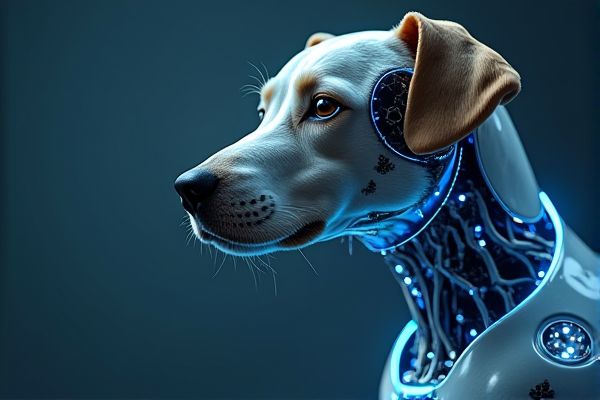
AI-driven pet care technologies are transforming how pet owners manage their animals' health and well-being. Smart collars equipped with AI analyze activity levels, monitor vital signs, and provide location tracking, ensuring pets are safe and healthy. AI applications streamline veterinary care by offering telehealth solutions, making it easier to connect pet owners with veterinarians for consultations or urgent advice. Automated feeding systems, guided by AI, allow for personalized nutrition plans, ensuring pets receive the proper diet based on their individual health needs.
AI usage in pet care technologies
Predictive Health Monitoring
AI usage in pet care technologies can enhance predictive health monitoring, allowing for early detection of health issues in animals. For instance, wearable devices can track vital signs and behavior patterns, providing insights into a pet's well-being. This proactive approach may lead to timely interventions, potentially reducing veterinary costs and improving pet longevity. By analyzing vast amounts of data, companies like Whistle are developing solutions that offer personalized health recommendations for pets.
Behavioral Analysis and Tracking
AI in pet care technologies enhances behavioral analysis and tracking capabilities. By utilizing machine learning algorithms, devices can monitor a pet's activities, providing insights into their health and habits. For example, a smart collar may track a dog's activity levels and alert owners to any changes that could indicate health issues. This type of technology presents the opportunity for more proactive pet care management and improved overall well-being.
Personalized Nutrition Plans
AI can enhance pet care technologies by creating personalized nutrition plans tailored to individual pets' needs. By analyzing data such as breed, age, and health conditions, these systems can suggest optimal diets that improve overall health. Companies like PetSmart are exploring AI-driven solutions to customize feeding recommendations for pet owners. This tailored approach may lead to better health outcomes and increased satisfaction among pet owners.
Automated Veterinary Consultations
AI-driven pet care technologies can enhance the efficiency of automated veterinary consultations. With algorithms analyzing symptoms and history, pet owners may receive faster responses regarding their pets' health. For instance, platforms like PetDesk utilize AI to streamline appointment scheduling and reminders. This innovation presents the possibility of improved health outcomes through timely interventions and reduced stress for both pets and owners.
Smart Collar Technologies
Smart collar technologies can provide health monitoring and location tracking for pets, offering owners peace of mind. These devices may enhance the pet care experience by analyzing behaviors and alerting owners to potential health issues. For example, companies like Whistle are utilizing AI to predict health trends based on gathered data. The chance of improving pet well-being through this technology presents a significant advantage for both pets and their owners.
AI-driven Pet Activity Trackers
AI-driven pet activity trackers offer the potential to enhance the health and well-being of pets by monitoring their exercise and behavior patterns. These devices utilize algorithms to analyze data, providing insights that can help pet owners make informed decisions about their pets' needs. Companies like Whistle are leveraging such technology, which may lead to better management of health conditions and preventive care. The ability to receive real-time updates increases the chances of improving the overall quality of life for pets.
Voice Recognition for Pets
Voice recognition technology in pet care can enhance communication between pets and their owners, making it easier to understand their needs. Devices utilizing this technology can, for example, detect specific commands or sounds made by pets, providing immediate feedback or assistance. The possibility of integrating such technology into smart collars could offer a range of benefits, from improved safety to health monitoring. Companies like PetSafe are exploring these advancements, showing the potential for innovation in pet care.
Customized Training Programs
AI has the potential to revolutionize pet care technologies by enabling more personalized experiences for both pets and their owners. Customized training programs, like those offered by companies such as PetSmart, can leverage AI to adapt to the unique behaviors and learning styles of individual animals. This could lead to more effective training outcomes and enhance the overall well-being of pets. As technology continues to advance, the chances for improved pet health and owner satisfaction grow.
Virtual Reality Pet Simulations
AI in pet care technologies can enhance pet health monitoring by providing real-time data on animal behavior and well-being. Virtual reality pet simulations may offer pet owners a unique way to bond with their pets, allowing them to engage in interactive experiences that mimic real-life interactions. These technologies can lead to improved training methods, as owners can work with virtual pets to practice techniques before applying them to real animals. With advancements in these areas, companies like PetSmart could see increased customer engagement and satisfaction, potentially driving sales growth.
AI-powered Pet Adoption Platforms
AI technologies can enhance pet care by providing personalized health recommendations based on animal behavior data. AI-powered pet adoption platforms streamline the matching process between potential pets and adopters, increasing the likelihood of successful placements. These systems analyze various factors, such as lifestyle compatibility and breed characteristics, to optimize adoption chances. Companies like Petfinder are examples of how AI can facilitate better outcomes in pet adoption.
 techknowy.com
techknowy.com